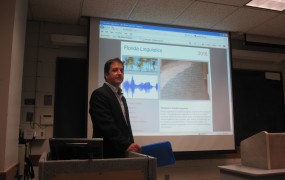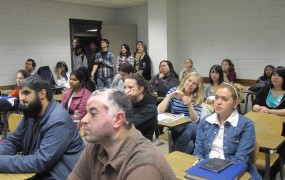The Role of Theoretical Core, Advanced, and Issues Courses in Linguistics
Monday, February 8th, 2010 @ 9:33PM
UF should offer graduate-level Phonology II and Syntax II –Article by Zoe Ziliak
Two years ago, I served as the UF Linguistics Society president. One of the president’s responsibilities, I think, is to keep an ear to the ground regarding grad students’ opinions about the program and pass important items along to the faculty for consideration.
Once, at Linguistics Happy Hour, I heard one of my fellow grad students telling a faculty member how they (sex veiled through plural pronoun use) felt like the training we received in theoretical linguistics could be stronger, and how they wished more core courses were required. I had to agree. In particular, I felt that when I moved from the semester of general phonology into issues in phonology, there was a gap in my knowledge that could have been filled by a second semester of basic phonological theory. (Luckily, I had read part of a handbook of Optimality Theory, but I think my classmates who hadn’t read that were at a loss for understanding, for example, alignment constraints.) The other student and I also mentioned that we felt that the core courses we had taken could have moved faster if the graduate sections were taught separately from the undergrad ones. (This doesn’t mean we hate undergrads. It just means that grad students are expected to work at a faster pace than undergrads.) The faculty member suggested that, as president of LingSoc, I take a survey of the graduate students to see what their feelings about these two issues were. I could then pass the results on to the faculty.
I therefore sent out an email to all the PhD students with the following questionnaire:
1) Do you feel that there should be separate phonology, morphology, and syntax courses for the graduates and undergraduates? That is, do you feel you would have learned more without the undergrads in those classes?
2) Do you feel that the department should require two semesters of phonology and two of syntax to better prepare us to work at an advanced theoretical level?
3) If you think both of these changes should be made, which do you think should happen first?
The wording might have been a little different, but that’s the gist of what I asked. Now, there are a couple things I regret about this survey. First, I regret not sending it to the MA students as well. At the time, I imagined that only the PhD students would be required to take these hypothetical Phonology II and Syntax II classes, so only they would be interested in the issue, but now I realize I should have given MA students a say as well. Second, I regret not BCC-ing everyone on this. You see, I naïvely assumed that everyone would reply to just me, and that their responses would look something like this:
1) Yes
2) No
Instead, many people hit “Reply all,” and they answered at length. And argued at length. Oh, doggies, it was memorable. I had had no idea that I was raising such a hot-button issue. The lesson here, kids, is to always use BCC. You will prevent a lot of arguments.
Anyway, I thought that this might be a proper venue to report on what the general drift of the responses was, and, since
I’m the one writing this blog, to put in my extra two cents.
What surprised me is how many people said they didn’t particularly want the undergrads to have separate sections from the grad students. I had heard several people complaining about the combined undergrad/grad courses in the past, so I had assumed that that would be what most people wanted to change. Instead, well over half the respondents said that they didn’t mind having the undergrads in class. Some even said that undergrads had helped them with their homework. If the linguistics faculty reads this, then, you should know that the majority of PhD students don’t mind the presence of undergrads in the core courses, so distributing faculty to allow for the separation of the groups needn’t be a high priority, at least from the point of view of the students.
Unsurprisingly, the proposal to introduce Phonology II and Syntax II was highly controversial. This is what really sent the emails flying back and forth. Students generally fell into one of two camps. The first camp agreed with me and the other Happy Hour student that a second semester of these two core courses would better prepare us for issues courses and seminars and also better prepare us for advanced theoretical work in general. One respondent pointed out that it would also prepare us better for the job market; it’s nice to be a sociolinguist, but it’s marketable to be a sociolinguist who can also teach phonology. These students tended to feel very strongly that they would have benefited from the extra coursework.
The other camp comprised students who felt very strongly that introducing Phonology II and Syntax II was a terrible idea. These students tended to believe that the courses already in place were challenging and informative enough to prepare us for more advanced work. They felt that two added required courses would add to their pre-dissertation burden and not help them learn what they really wanted to know. One student argued that they came to grad school to take sociolinguistics and SLA courses; having to sit through core theoretical courses for one semester each was bad enough.
As I said, people tended to have strong opinions one way or the other on this. No one seemed indifferent to this proposal! The opinions were also roughly evenly split between the two sides; there was no clear majority. Based on this, I have a suggestion for a future direction the department could go in, if someday we have enough faculty to make it feasible.
I propose that Phonology II and Syntax II courses be introduced but not technically mandatory. Instead, I suggest that people who want to take issues in phonology be required to first take Phonology II, and those who want to take issues in syntax or the seminar in syntax likewise be required to take Syntax II. That way, PhD students who really want to get out of the core coursework and on to socio or psycholinguistics can take issues in historical linguistics and issues in morphology without having to take extra preparatory courses, while those who plan to work in either phonology or syntax can receive a more thorough grounding in the basics of modern theory before attempting more advanced work.
Right now, MA students are required to take one issues class. Under the new system, I propose that they be required to take one of the following: issues in historical linguistics, issues in morphology, Phonology II, or Syntax II. That way, they still have the choice of learning more about whichever area they’re most interested in, but they don’t have to risk graduating late just because they happen to love syntax. (Of course, they would still be allowed to take issues in phonology or issues in syntax as well. It just wouldn’t be required.)
I think that proposal is a fairly good compromise between what the two camps want. Those who want more exposure to theory can get it, while those who dislike it can avoid it.
Of course, I realize this is all hypothetical for the moment because we don’t exactly have faculty sitting around looking for extra courses to teach. However, I also have heard that the faculty do have a goal of separating the undergraduate and graduate sections of phonology, syntax, and morphology, and I thought I should make it known that the majority of PhD students, at least, don’t consider that necessary. If there ever comes a day when we do have faculty members available to add a couple more courses, I suggest that the priority should be to introduce new second-semester courses in phonology and syntax.
To see additional discussion on this topic, comment, and let us know how these issues are handled in departments of other universities please visit the FL Facebook group page (and become a member if you haven’t already!):
http://www.facebook.com/topic.php?topic=14535&uid=270120532039#!/group.php?gid=270120532039
Posted by floridalinguistics
Categories: Zoe Ziliak









